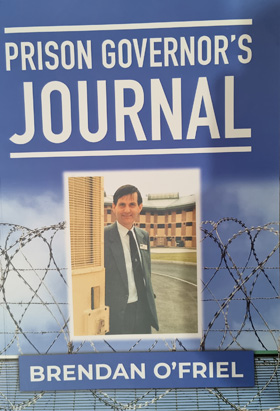Author: Brendan O'Friel
ISBN No: 9781526208477
Review date: 20/04/2024
No of pages: 256
Publisher:
Publisher URL:
http://wwwlexiconbookshop.co.im
Year of publication: 14/01/2022
Brief:
Brendan O’Friel is not without connection to the private security industry, just as, as a prison governor in his career, he was like anyone in HM Prisons Service, with a link to security in that the whole purpose of any prison is to keep offenders in; and separate from society. The title hints at the journal a governor was supposed to keep a journal – though inevitably some would record more than others.
Prison Governor’s Journal is an apt title because this book is more than a mere memoir, although that’s not to disparage memoirs which give a personal flavour. That’s all the more welcome in a book about prisons, because society knows little of what goes on behind prison walls, and may take what they think they know from the media, whether Porridge in the 1970s or Screw in 2021 on Channel 4.
O’Friel suggests that the pandemic lockdowns may present an ‘unexpected opportunity’, because the public unexpectedly found itself with little notice deprived of some liberties. O’Friel wonders if as a result at least some people ‘may be prepared to revisit attitudes to imprisonment, providing a window of opportunity for change’. As that implies, the author sees the past decades of British prisons (after retirement, he did work with the Republic of Ireland’s equivalent service) as ‘troubled’ and in crisis, due above all to over-crowding.
O’Friel wants above all to see a ‘fresh start’: reducing re-offending by offering training for prisoners, and reducing re-offending on release by giving more support. Briefly, he advocates ‘adequate numbers of carefully selected, well trained staff’; encouraging governors, rather than scapegoating them for failures, and giving governors as leaders of their prisons scope to experiment with ‘what works’; and to offer after-care for prisoners, and prepare them better for release. All that would take money, and political will. With his perspective, O’Friel praises Willie Whitelaw of the 1970s and Douglas Hurd of the 1980s as Home Secretaries; and has less regard for Michael Howard in the 1990s for reversing progress.
Regrettably, for a private security audience, he does not say anything about his years – the crucial formative years from 2003 – as a board member of the Security Industry Authority (SIA). He does take the reader through his career, from the 1960s to the 1990s, most strikingly as governor of Strangeways in Manchester which erupted in rioting in April 1990. In fact it started on Sunday, April 1 and was the longest siege in British penal history, only ended with an ‘attack’ on April 25. By September, O’Friel was governor at another prison, Risley.
Rather than digest for you the 22 pages on the riot and the official inquiry afterwards, you should buy the book!? It begins with O’Friel alerted to a ‘full scale riot’ and driving into Manchester from his home, and seeing a police helicopter hanging over the prison – indeed not a good sign if you are travelling into work at any workplace. O’Friel was only able to make it inside the jail protected by a shield because, infamously, the prisoners had made it onto the roof and threw slates – and so began stressful weeks of fact-finding (were any prisoners dead, murdered by other prisoners? it took some confirming that there were not) and decision-making. Suffice to say that the book ought to be an important and first-person addition to the knowledge of crisis management.
But that ought not to detract from O’Friel’s career in the service. He has published an account of where he worked and married it to the larger penal and societal issues. To touch on only those of most interest to private security people, he discusses hostage-taking and other risks; and manipulative prisoners who may get prison staff or others to do their bidding. He covers staff and institution culture; equipment, including dogs and handlers; and experiences of dealing with difficult and violent prisoners. He is commendably frank, for example not (as may be the temptation whatever your occupation) showing only the good side of prison staff. He touches on prison inspections, staff overtime abuse, and ‘industrial relations’. In his time, computers came into prisons, answering a practical problem that seems nonsense today – how to know, any day, how many prisoners were in a jail, and who were they? Also permeating this book are a Manx heritage and a Christian faith.
On that point, it’s worth quoting at length (from page 196) what O’Friel had to say after attending mass in prison in 1995 towards the end of his time, ‘always a great learning experience’. Some women prisoners presented him with a knitted outfit for his first grandchild:
“Many prisoners care deeply about people as this touching gesture showed. I had learned a great deal in the 30 years I had worked with prisoners and the most important principle was that prisoners are very like the rest of humankind – good and bad, but certainly not a race apart. Each one needed to be treated individually, justly and with dignity. Prisoners learned from us but we also learned from them as their faith and approach, on occasions, was quite remarkable.”
We might add that such a credo can also serve as a commentary on the Strangeways riot; not all prisoners there took part or even wanted to.
All in all, there’s much to enjoy and learn from in this book, whether you want to know more about our prisons, or glean learnings about managing a crisis – and crises don’t get much harder than a prison riot. Yes, O’Friel concludes, we still need prisons for the most dangerous; but do we need more prison places than European neighbours, when British prisons have remained chronically short of resources for reducing re-offending, and thus increasing public safety?
Where to buy: order through Lexicon Bookshop, Douglas, Isle of Man – https://www.prisongovernorjournal.com/where-to-buy.html.









